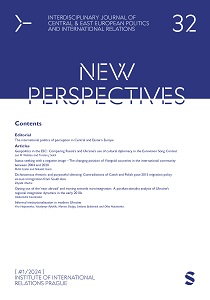Opting out of the ‘near abroad’ and moving towards eurointegration: A postfunctionalist analysis of Ukraine’s regional integration dynamics in the early 2010s
Opting out of the ‘near abroad’ and moving towards eurointegration: A postfunctionalist analysis of Ukraine’s regional integration dynamics in the early 2010s
Author(s): Oleksandra KovalevskaSubject(s): International relations/trade, EU-Accession / EU-DEvelopment, Geopolitics
Published by: SAGE Publications Ltd
Keywords: Eurasia; European Union; postfunctionalism; regional integration; Russia; Ukraine;
Summary/Abstract: This article examines the utility of a revised postfunctionalist theory in explaining regional (dis)integration dynamics. The case study employed to test the theoretical framework is based on Ukraine’s regional integration processes with respect to Eurasian and European regional organizations in the early 2010s. The principal research question posed is: what factors contributed to Ukraine’s decision to opt out of deeper integration with Eurasia in the early 2010s and pursue integration with the European Union insead, and how can this case study move the postfunctionalist theory forward? Three assumptions proposed by postfunctionalism, enriched with insights from social constructivism, were applied to the (dis)integration processes: salience, politicization, and collective identity. The analysis suggests that the revised postfunctionalist framework is indeed instrumental in explaining both integration and disintegration, providing insights into the role of collective identity mobilization once public discussion reaches a critical juncture in the politicization process.
- Issue Year: 32/2024
- Issue No: 1
- Page Range: 74-90
- Page Count: 17
- Language: English
- Content File-PDF

